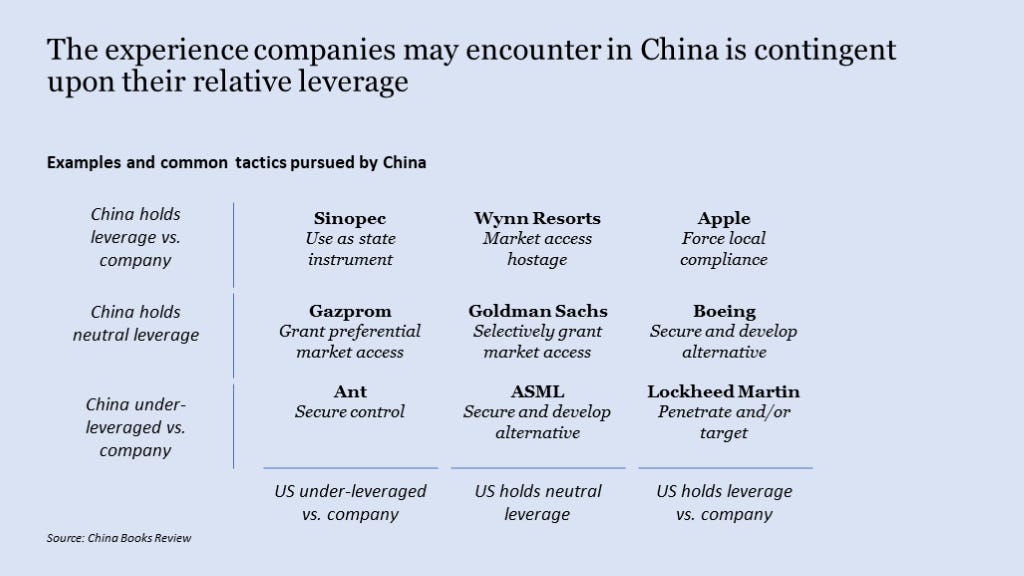The past several years have been an unrelenting challenge to multinational CEOs determined to profit in China. Covid laid bare the vulnerabilities from overreliance on the country as a supply hub. Western governments, which increasingly see the country as an adversary, have made it more difficult to do business. Beijing, with its mix of targeted capriciousness and self-destructive macroeconomic policies, has been little help. And Russia’s invasion of Ukraine has made the prospect of conflict over Taiwan tangible enough to prompt hedging.
Some CEOs are even becoming more outspoken in their frustration about doing business. “There is growing political interference in the way we do business as a Western company in China,” Carlos Tavares, CEO of carmaker Stellantis, recently complained. While a refreshing change from vapid boosterism, remarks such as these still betray a fundamental ignorance about multinationals’ presence in China. From the vantage point of the CCP, multinationals have always been political instruments.
Multinationals know why they are in China – to profit. But ask why their businesses are permitted to operate there and their answers may be less assured. The CCP scoffs at the invocation of trade reciprocity. Advancing China’s development may have once been an acceptable answer, but no longer. Yet it at least acknowledges a degree of heightened conditionality that differs from nearly every other market in which multinationals operate.
In the early days of reform and opening, Western firms were welcomed – with varying degrees of wariness – as sources of investment and knowledge intended to advance the country’s development. This evolved into an expectation that they support China’s indigenous innovation. As domestic competitors became increasingly capable, multinationals evolved to serve as a pacing challenge at home and abroad. And now, multinationals are increasingly seen as a source of leverage and influence over their home country governments.

Companies should understand that their continued presence in China is contingent upon fulfilling one of eight roles, ranked in rough order of their durability. First are products for which there are no alternatives: it will be some time before Comac seriously rivals Airbus and Boeing. Closely related are firms whose products offer global network effects greater than what China’s own considerable market can offer, such as Microsoft’s Windows operating system.
Third are firms whose presence advances a policy outcome. China’s entry into the World Trade Organization was as much an effort to backstop domestic reforms as it was an effort to pursue international opportunity. China’s growing embrace of Wall Street should be understood in the context of Beijing’s aspirations to reform its asset management industry and become a financial power commensurate with its industrial might. Fourth are firms that still have useful knowledge to offer. Tesla’s notably preferential treatment comes in return for it serving as a “catfish” that will spur on domestic carmakers.
FIfth are companies with significant local constituencies. Yum! Brands and McDonald’s both created one in their decision to franchise their operations; Apple’s status as a major, albeit indirect, employer grants its business relative staying power. Indeed, some firms have localized to such an extent as to be nearly unrecognizable; they should take a hard look at whether what they are learning in China offers them a global competitive edge. If not, they should divest.
Sixth, are producers of (typically essential) products requiring high quality standards that domestic rivals cannot reliably match. Foreign baby formula was once privileged due to food safety scandals among domestic producers, but the latter have recovered and are now estimated to command a majority share.
Seventh are products potent with symbolism for the country’s middle class, validating their sense of prosperity and cosmopolitanism. The government may be loath to see foreign currency flow back to Chanel shops in Paris, but it can settle for Hainan shopping sprees for the same goods.
Last, are companies whose presence in China, as a buyer or seller, grants them a source of leverage over the home country for varied political, technical, and economic reasons.
Almost no major company CEO is naïve enough to see China as simply a large market. But too many settle for the incomplete understanding of it as just another politically challenging one. Few appreciate the basis on which their presence is tolerated. And almost none understand the ideological animus that fuels China’s challenge to the order that makes multinationals’ prosperity possible.
Multinationals have braved hacks, boycotts and regulatory storms for as long as they have done business in China. But new headaches may be on the horizon. With locals now occupying most in-country leadership positions, headquarters should prepare for the possibility of corporate mutinies. China’s global regulatory impact is only just beginning to be felt. And even as companies diversify production in Southeast Asia, they will still often find themselves contracted with Chinese partners subject to Beijing’s influence.
Since foreign firms first began entering China, there has been sufficient overlap of interests – and mutual leverage – for both multinationals and the CCP to get what they wanted from the other. That is changing – and if companies’ strategies do not evolve with it – more trouble lies ahead.